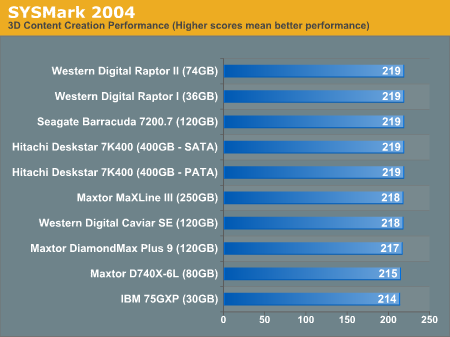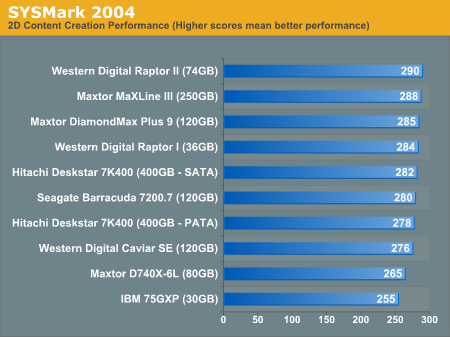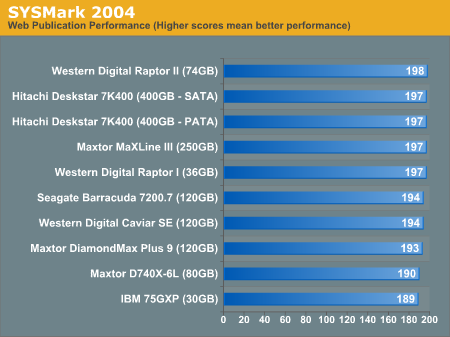Hitachi Brings 400GB to Desktops with the Deskstar 7K400
by Anand Lal Shimpi on July 10, 2004 12:00 AM EST- Posted in
- Storage
Overall System Performance - SYSMark
SYSMark 2004 is divided into two separate suites: Internet Content Creation and Office Productivity. What makes SYSMark an ideal hard disk benchmark is that its scores are totals of response times, meaning that the benchmark measures how long the system takes to respond to a task (e.g. how long before a search and replace is completed after it is initiated) and sums up all such response times to generate a score. This score is generated for six total subcategories: three under Internet Content Creation and three under Office Productivity.For the most part, SYSMark is CPU/platform bound, but we will see some variations in performance according to disk speed; at the same time, there are a couple of benchmarks within SYSMark that are heavily disk dependent.
First, we start with Internet Content Creation performance. The first category that we will deal with is 3D Content Creation. The tests that make up this benchmark are described below:
"The user renders a 3D model to a bitmap using 3ds max 5.1, while preparing web pages in Dreamweaver MX. Then the user renders a 3D animation in a vector graphics format."

No surprises here. The 7K400 performs just as well as the rest of the modern drives.
Next, we have 2D Content Creation performance:
"The user uses Premiere 6.5 to create a movie from several raw input movie cuts and sound cuts and starts exporting it. While waiting on this operation, the user imports the rendered image into Photoshop 7.01, modifies it and saves the results. Once the movie is assembled, the user edits it and creates special effects using After Effects 5.5."

While not performing quite as well as the Raptors and Maxtor drives, the 7K400 finds itself stuck in the middle of the performance charts.
Interestingly enough, the Parallel ATA version of the 7K400 continues to be ever so slightly slower than the SATA version, but once again, it's nothing even remotely perceivable.
The Internet Content Creation suite is rounded up with a Web Publishing performance test:
"The user extracts content from an archive using WinZip 8.1. Meanwhile, he uses Flash MX to open the exported 3D vector graphics file. He modifies it by including other pictures and optimizes it for faster animation. The final movie with the special effects is then compressed using Windows Media Encoder 9 series in a format that can be broadcast over broadband Internet. The web site is given the final touches in Dreamweaver MX and the system is scanned by VirusScan 7.0."

Once again, we find the 7K400 creeping up to the top of the charts, but you'd be hard pressed to find any real performance differences between any of these drives.










18 Comments
View All Comments
Falloutboy - Saturday, July 10, 2004 - link
This is great but unless it geting into the 50cents per gig range it won't really make sence. I could just get 4 200gbs for the same price and raid themgimpsoft - Saturday, July 10, 2004 - link
if you have space for 4 drives on your casei say go with mulitple 160GB hard drive or 149GB true GB
149 * 4 = 596GB almost 600GB
$93 * 4 = $372
for $93each why pay $450 for 320GB
samsung Hard Drives on newegg
mulitple drives is much better then one
C/windows E:/storage X:/storage D:/storage
so you uncompress a file from C to C will take longer & won't be able to open anythign else until uncompress is done
from E to X or from C to X you could surf the web have an dixv open with small slow down & have it finish faster then having to be done in one drive
Jeff7181 - Saturday, July 10, 2004 - link
Nice to see capacities increasing. Seems like for a while there hasn't been much in the way of capacity increases... just some speed increases with the Raptor and SATA.A friend of mine heard about the drive too and asked why anyone would need 400 GB of storage space if they weren't doing anything illegal like pirating software or media. My answer to him was, programs (especially games) will only get larger. And with no worries about storage limits, you could rip your entire CD collection in a lossless format and keep it on your hard drive for listening and making MP3's to put on a portable device, etc. Then there's video... with more people building HTPC's, a 400 GB drive would be a nice addition to a HTPC for recording TV shows in HD... copying your DVD's to the drive for quicker viewing and not having to mess with the discs all the time.
I think storage space is lagging behind a little bit... I have a 36 GB Raptor and an 80 GB drive and I don't find myself running out of storage space, however, I do find myself deleting things thinking "I don't really need this, I'll just get rid of it and free up some space." I remember back in the mid 90's I think, I bought a 12 GB Quantum drive, when high capacity mainstream drives were 6-8 GB... the Quantum was a HUGE drive at the time, but pretty slow. Where are the HUGE but slow drives today? I think it would be acceptable to use a 5400 RPM drive in a HTPC if it could offer 50-100% more storage space thana 7200 RPM drive, AND be more quiet and cooler. Or just for people who archive home movies or something... an 800 GB drive would be great for them... speed wouldn't matter all that much because a 5400 RPM drive is perfectly capable of streaming DVD quality video and audio.
Anyway... as I said... it's nice to see storage capacity increasing, not just speed.
mkruer - Saturday, July 10, 2004 - link
"If you can wait on that hard drive upgrade, however, much newer technology is coming next quarter. With platter densities finally surpassing the 100GB mark, 16MB buffers to accent and with NCQ becoming mainstream, the 400GB offerings that should hit the streets later this year will hopefully offer more than just massive storage capacities, but maybe even a new level of performance."Anand, do you have any specific information on future roadmaps by the manufactures. I would be interested to see how Western Digital will respond.
kjellrni - Saturday, July 10, 2004 - link
kjellrni - Saturday, July 10, 2004 - link
pookie69 - Saturday, July 10, 2004 - link
Nice article. I can appreciate the difficulties in trying to bench and review HDDs, but so far i feel you have done a good job, and i am very much enjoying reading these HDD reviews.Only thing, it may have been a good idea to talk a bit about some of the technical features of the Hitachi 7k400 - such as those 2 sensors on the underside of the HDD that help ensure much greater spindle head accuracy through system vibrations than currently seen in other HDDs. The name of the technology evades me now, but it sounds really cool.
In any case, great review - the Seagate Barracuda 7200.8 looks like being an awesome HDD, so i do hope that there'll be a rview on that sometime soon :)
ROcHE - Saturday, July 10, 2004 - link
Nice review. The recorded hard disk sound is a very good addition. You guys just need to edit the first 1-2 and last 1-2 seconds to remove those weird sounds and it will be perfect.You can actually hear how silent is a barracuda and how loud is a Maxtor or a WD SE.
It's good to see my one year old Western Digital SE near the top of the performance charts. It shows how hard it is to improve hard disk performances. Kudos to Hitachi for a great hard drive.
Thanks ;)